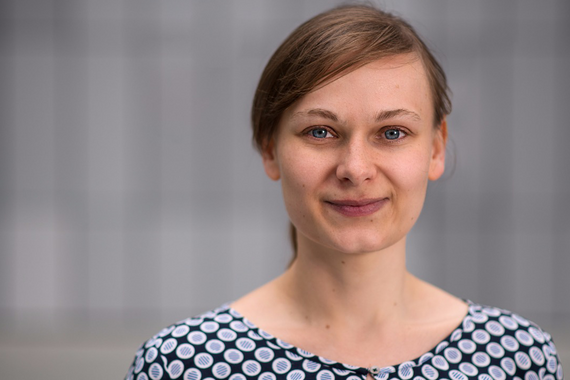- The University
- Studying
-
Research
- Profile
- Infrastructure
- Cooperations
- Services
-
Career
- Med Uni Graz as an Employer
- Educational Opportunities
- Work Environment
- Job openings
-
Diagnostics
- Patients
- Referring physicians
-
Health Topics
- Health Infrastructure
Research team Kornmüller
Research focus: Precision medicine
PI: Karin Kornmüller
Focus: The Nanomedicine Lab is focusing on the design and structural characterization of nanoparticles as natural or biomimetic nanocarriers for biological molecules and new drugs. The main focus of our research is on molecular assemblies of lipids and proteins to target specific cell types, tissues or biological barriers. The aims are addressed through a combination of innovative technologies in nanoparticle synthesis, structural biology and nanometrology.
Network: The Nanomedicine Research Team is nationally and internationally very well connected through short- and long term cooperation projects. Representative examples are scientific collaborations with partners at large scale infrastructure facilities like ILL, France and Synchrotron Trieste, Italy, but also close industrial relationships as translational settings. We are members in EU projects and in international networks. Close cooperation across Graz Universities and between Graz research groups are very well established. Internal collaboration involves the Division of Cell Biology, Histology and Embryology (Gerd Leitinger) and research groups from Molecular Biology and Biochemistry. Intensive collaborations exist with the Nano Optics Group of Ulrich Hohenester (Institute of Physics, Uni Graz), with David Clases (Nano Micro Lab, Institute of Chemistry, Uni Graz) and with FELMI-ZFE (Electron Microscopy and Nanoanalysis, TUG, Harald Fitzek).
Projects
AAMLA: Apolipoprotein AI (apo-AI) Mimetic Peptide Lipid Assemblies
- Aim of the project is to determine the structural and dynamic properties of artificially produced high density lipoprotein (HDL) nanoparticles and to correlate them with their biological behavior. These nanoparticles have anti-inflammatory and anti-oxidative properties and are proposed as a new class of therapeutics. Furthermore, we are investigating how oxidized lipids, which are significantly involved in disease progression, influence the structure and functionality of our nanoparticles.
- Project duration: 2021-2025
- Funded by FWF, ANR
- Collaboration partners: Gunther Marsche (OLRC/MUG, Austria), Mounir Tarek (LPCT, Université Lorraine, France), Burkhard Bechinger (UNISTRA, Université Strasbourg, France).
NanoPAT: Process Analytical Technologies for Industrial Nanoparticle Production
- Research and production of nanosized objects demand sophisticated nanometrology for continuous characterization, sensing and process monitoring. The NanoPAT Horizon 2020 EU-project (www.nanopat.eu) further develops real-time nano characterization technologies based on the proprietary new OptoFluidic Force Induction (OF2i®) principle. This in-house developed nano-characterization technology provides continuous sizing, concentration and distribution data as online applicable sensor which is currently in translation and industrialization through the founded Med Uni Graz spin-off BRAVE Analytics GmbH.
- Duration: 2020-2024
- Funded by: EU (Horizon 2020)
- Project leader: Christian Hill (Medical Physics and Biophysics, GSRC, Med Uni Graz)
- Project partners: European Consortium.
LOGOS-TBI: Light-controlled organic semiconductor 3D-structure implants for improved regeneration after traumatic brain injury
- We explore a fundamentally new concept to improve functional recovery after brain injuries. Nanostructured organic implants contain a photoactive layer that converts light pulses into surface charging. Thus, light-stimulation can trigger action potentials in attached neurons. This approach aims to promote neuronal networking, improve connectivity and enhance regeneration of injured brain tissue. The study interconnects the expertise of various disciplines and facilities: structural biology and nanomedicine, biophysics, electrical engineering, neuroscience and experimental neurotraumatology.
- Duration: 2019-2024
- Funded by: FWF Zukunftskolleg
- Project partners: Muammer Ücal (Research Unit for Experimental Neurotraumatology, Med Uni Graz), Susanne Scherübel-Posch (Medical Physics and Biophysics, GSRC, Med Uni Graz), Theresa Rienmüller (TUG), Rainer Schindl (Medical Physics and Biophysics, GSRC, Med Uni Graz), Vedran Đerek (Department of Physics, Faculty of Science, University of Zagreb), Eric Głowacki (CEITEC, Brno University of Technology, Czech Republic).
STRUDEL: Structural and Dynamical Exploration of Low Density Lipoprotein (LDL)
- LDL is a natural nanoparticle that mediates the transport of cholesterol in human circulation - it also plays a prominent role in the development of atherosclerosis. The development of new treatment strategies requires a deep understanding of LDL’s molecular structure and function. However, its complex three-dimensional structure, consisting of lipids and protein, has not yet been fully solved. Our aim is not only to describe the structure of LDL, but especially to include its dynamical aspects. We achieve this with an integrative approach that combines various state-of-the-art methods: (cryo)electron microscopy, MD simulations, high-speed atomic force microscopy, X-ray and neutron scattering.
- Project duration: 2022-2027
- Funded by: FWF, ANR
- Collaboration partners: Judith Peters & Tamas Foeldes (ILL, Grenoble, France), Ambroise Desfosses (IBS, Grenoble, France), Peter Hinterdorfer (JKU Linz, Austria).
AoDiSys: Asynchronous Dilution System for industrial manufacturing processes in pharmaceuticals, biotechnology, and material technology
- This three-year FFG project aims to scientifically support the development, implementation, and validation of the AoDiSys (Asynchronous Dilution System), which is designed for industrial manufacturing processes in pharmaceuticals, biotechnology, and material technology in collaboration with BRAVE Analytics GmbH. AoDiSys enables the integration of the nanoparticle characterization technology OF2i® (OptoFluidic Force Induction) into production plants to improve real-time process feedback and quality control for nanoparticle-based products such as infusions, vaccines, and coatings. This reduces waste, saves resources and energy, and provides new insights into process workflows.
- Project duration: 2023-2026
- Funded by: FFG
- Project leader: Christian Hill (Medical Physics and Biophysics, Med Uni Graz)
- Project partners: BRAVE Analytics GmbH, Pharmaceutical industry.



